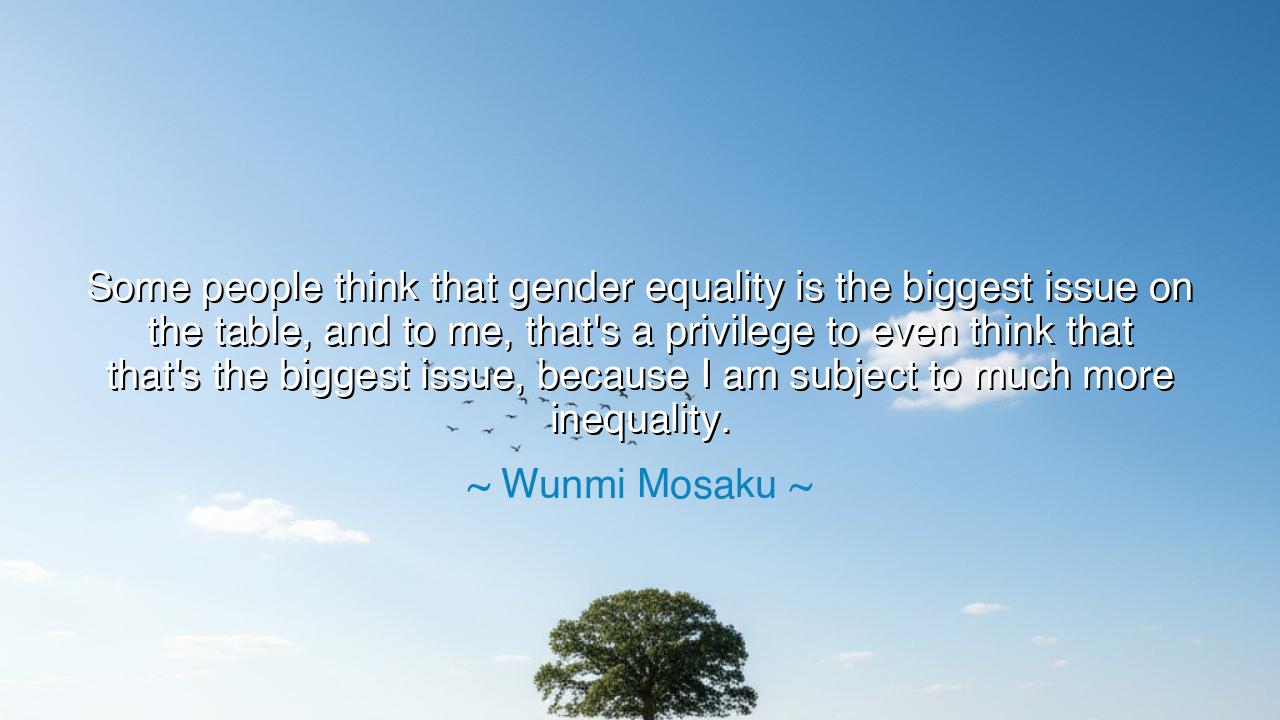
Some people think that gender equality is the biggest issue on
Some people think that gender equality is the biggest issue on the table, and to me, that's a privilege to even think that that's the biggest issue, because I am subject to much more inequality.






In the grand tapestry of human struggle, there are countless threads of inequality that weave through the lives of individuals. Wunmi Mosaku speaks with deep wisdom when she declares: "Some people think that gender equality is the biggest issue on the table, and to me, that's a privilege to even think that that's the biggest issue, because I am subject to much more inequality." These words, though spoken in a modern context, echo the timeless struggles that have shaped the lives of many throughout history. They remind us that the battle for equality is not singular in its nature, but complex and multifaceted, with different forms of oppression often intersecting in the lives of those who face them.
Mosaku’s words illuminate a powerful truth—that privilege is not only about having access to opportunity but also about the perspective from which we view the world. The belief that gender equality is the foremost issue speaks to the experiences of those who are privileged in certain ways—those who may not feel the weight of multiple forms of discrimination. But to someone who is oppressed in ways beyond gender—through race, economic status, or immigration status, for example—this gender struggle may seem secondary to more pressing realities of survival and dignity. Mosaku's insight asks us to expand our understanding of inequality, to recognize that the struggles of marginalized communities often include layers upon layers of oppression, each one compounding the others.
The ancients understood this well, as many cultures recognized the interconnectedness of various forms of discrimination. In ancient Rome, for instance, slaves and women were both oppressed, but their oppression took different forms. While women were often denied political power and rights, slaves were seen as property, with no voice at all. Yet both women and slaves shared one essential characteristic—they were both subjected to systemic inequality. The philosopher Seneca spoke of the chains of inequality that bound all people who were not free, whether they were slaves or women, reminding us that true freedom and equality cannot exist for some while others remain enslaved in various ways. Mosaku's statement brings us back to this ancient understanding: inequality is not monolithic, and the battle for true justice must address all forms of it.
The struggle for equality that Mosaku refers to reminds us of the great movement for civil rights in the United States, where leaders like Martin Luther King Jr. sought not just for the end of racial segregation, but for the upliftment of all oppressed peoples. King’s words about justice echo in the modern world: "Injustice anywhere is a threat to justice everywhere." Just as Mosaku points out that gender equality is just one of many forms of inequality, King understood that the fight for racial justice was inseparable from the fight for economic justice, gender equality, and the end of imperialism. The intersectionality of these struggles shows us that freedom is a collective goal, and no one form of oppression can be separated from others.
The lesson of Wunmi Mosaku's words is that privilege allows certain individuals to see the world through a lens that simplifies struggle, reducing it to a single issue or challenge. But for those who face multiple layers of discrimination, the world is much more complex. This is the truth of intersectionality—the understanding that different forms of oppression do not act independently but combine in ways that can intensify the experience of injustice. Mosaku’s words are a call to broaden our understanding of equality and to see the many faces of oppression that exist in the world. She asks us to recognize that the fight for gender equality is vital, but it must not overshadow the fight for other forms of justice.
In our own time, let us heed the lesson that privilege comes with responsibility—the responsibility to see beyond our own struggles and to recognize the multifaceted nature of inequality. As Mosaku teaches us, privilege is not simply about having access to opportunity, but about having the space to frame our own issues in a way that makes them the central narrative. It is crucial, then, that we expand our understanding of justice, recognizing that gender equality is just one part of a much larger fight for a world where all people, regardless of race, class, or gender, are treated with dignity and respect.
Let us act with empathy and solidarity, acknowledging that true equality is an intricate, layered pursuit. Let us work towards a world where the oppressed are not just heard, but empowered to dismantle the systems that bind them. In this journey, may we follow the wisdom of those who have walked before us, learning that true equality cannot be achieved for one group alone—it can only be realized when all who are oppressed find their voice, their freedom, and their place in the sun.






AAdministratorAdministrator
Welcome, honored guests. Please leave a comment, we will respond soon